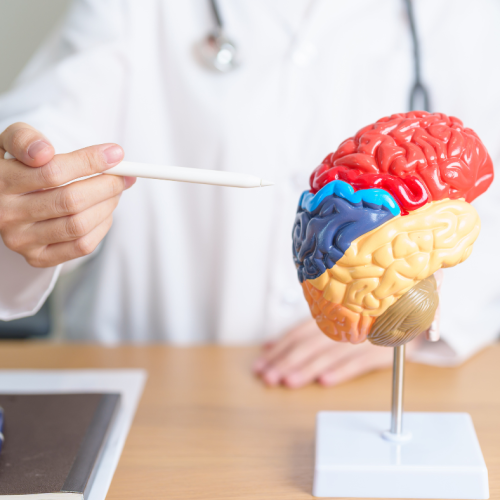Understanding 6 Types of Dementia

Let’s take a moment to explore what dementia truly is and break down six common types of dementia. Dementia is a group of symptoms. It is a general term that we think of as an umbrella term with many types falling under the umbrella. Dementia is not a specific disease, but rather a symptom of a disease. There are many variations of dementia including reversible and irreversible dementias.
Understanding the various types of dementia is important for providing appropriate care and support, whether you’re a caregiver, family member, or a healthcare professional. In this blog, we’ll explore some of the different types of dementia, their key characteristics, and what they mean for those living with the condition.
Reversible Dementia
These conditions can present with dementia, but if addressed and effectively treated, the symptoms of dementia are reversed.
Infection
Vitamin deficiency
Hearing loss
Dehydration
Depression
Metabolic disorder
Head injury
Irreversible Dementia
These conditions are progressive and cause a permanent decline in cognition, so the symptoms of dementia are not reversed.
Alzheimer’s Disease is the most common type of irreversible dementia. It may present in the early stages with the inability to recall recent events and impaired learning. The person may experience memory loss, confusion, difficulty with problem solving, and communication problems. Alzheimer’s Disease is caused by amyloid plaques and tau tangles in the brain that prevent the brain from sending messages properly.
Vascular Dementia is the second leading cause of irreversible dementia. This is caused by reduced blood flow to the brain, typically related to a stroke or TIA (transient ischemic attack) or other vascular conditions. Symptoms may be related to where the stroke occurred in the brain, and it can develop gradually or suddenly. Early symptoms generally include impaired judgment, difficulty with planning and attention. Memory loss can also develop.
Lewy Body Dementia or Dementia with Lewy Bodies is caused by abnormal protein found in the brain, called Lewy bodies. This can cause movement issues such as tremors and falls, as well as hallucinations, syncope and sleep disorders. Cognitive impairment starts just before or simultaneously with the motor symptoms. People living with this dementia have a greater risk for neuroleptic sensitivity where a serious adverse effect results when taking neuroleptic medications.
Parkinson’s Disease Dementia usually develops several years after the motor symptoms present. The cognitive changes may include short attention span, memory loss, confusion, or difficulty with reasoning. Anxiety, depression, hallucinations, sleep disorders and personality changes may also occur. Some providers will use a DaT (dopamine transporter) scan to help diagnosis Parkinson’s disease.
Frontotemporal Dementia (FTD) affects the frontal and temporal lobes of the brain. There may be a behavioral variant presenting with loss of empathy, personality changes, or a compulsive behavior. FTD can also have a language variant where there is difficulty finding the right words, communicating through speech and inability to comprehend. A person living with FTD can have both variants. Most are diagnosed between age 56 and 65.
Mixed Dementia is a combination of two or more types of irreversible dementia. The most common combination is Alzheimer’s disease and vascular dementia. Because this type of dementia presents with multiple symptoms that may resemble another dementia, diagnosis can be difficult. Memory loss, confusion, changes in mood, impaired problem solving, and impaired judgment can occur.
Conclusion
Understanding the types of dementia enables you to recognize early symptoms more accurately and respond with informed decisions. Each type of dementia can present with its unique cognitive, behavioral and physical changes, so being aware of the specific signs can help you identify when something is amiss with your loved one.
Additionally, understanding the types of dementia allows families and caregivers to anticipate future needs of the person living with dementia. For example, Alzheimer’s Disease may have a gradual memory loss, where FTD might cause more drastic behavioral changes. This knowledge allows for more personalized care planning, including legal and financial preparedness, reviewing long term care options and creating supports to address potential emotional and physical changes that come with the progression of the disease.
By helping you understand the type of dementia your loved one is facing, we can work together to create a care plan that honors your loved one’s needs and ensures their safety, comfort and dignity. Whether you’re just beginning to recognize symptoms, or you have been navigating this for a while, my goal is to empower you with knowledge and support through the journey. Please contact me to discuss your circumstances and learn how I may be able to assist you.
